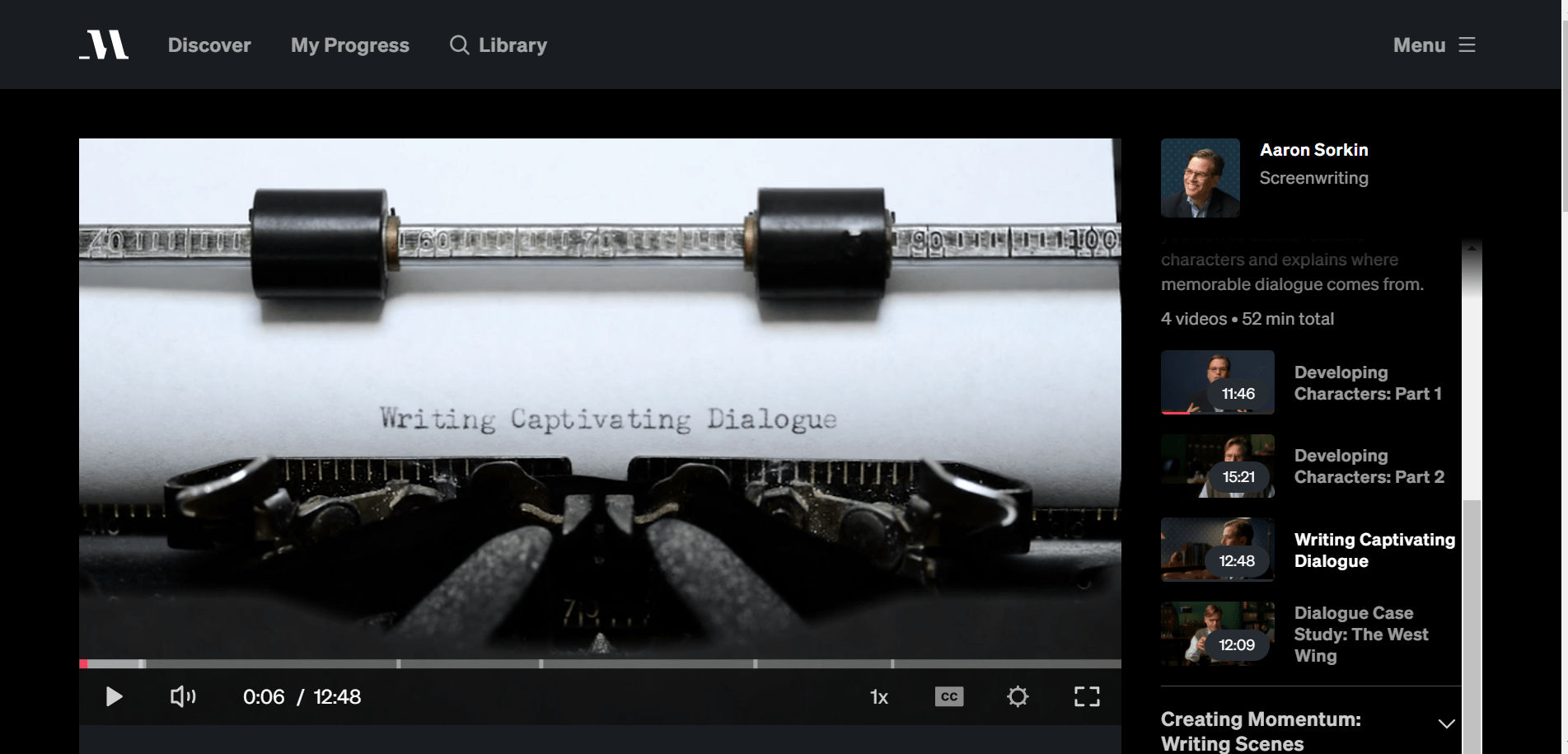As a successful screenwriter, Aaron Sorkin’s films have collectively grossed about US$400 million worldwide, establishing him as one of the best screenwriters of the modern era.
So, now that he has done it all and experienced almost every aspect of screenwriting that is required to become a good one, Sorkin is ready to pass on his knowledge, wisdom, and expertise to his admirers and aspiring writers with his own Screenwriting Masterclass!
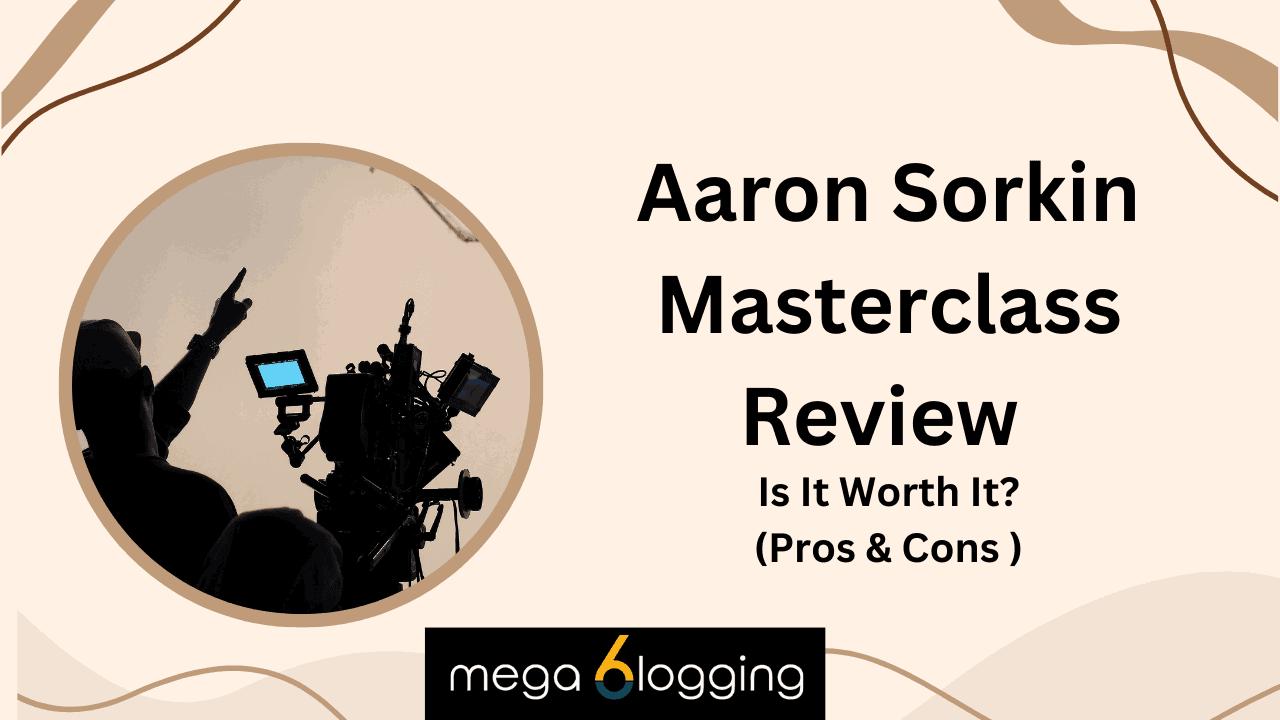
About Aaron Sorkin
Screenwriter and director Aaron Sorkin hails from the United States, and he is best known for his work on the television shows The West Wing and A Few Good Men.

Because of his work on “The Social Network,” he was awarded the Academy Award for Best Adapted Screenplay in the year 2010. (one of my favorite films).
The screenplay for his biopic Steve Jobs, which was released in 2015, earned him a Golden Globe Award.
Additionally, he has been honored with five Primetime Emmy Awards for his work on The West Wing.
About the MasterClass Program
In 2015, the company MasterClass was established as an online instructional resource. It specializes in providing video-based courses that span a wide variety of subjects, ranging from Physics to Cooking.
The instruction that it provides is its main selling feature. There are approximately 150 programs available on MasterClass, all of which are taught by individuals who have attained celebrity status in their respective fields of expertise. People like Gordon Ramsay, Hans Zimmer, and James Patterson are just a few examples.

When compared to other websites that include academics, MasterClass takes education to a higher level by giving users the opportunity to study from well-known, respected figures in the public eye.
Even if MasterClass is unparalleled when it comes to its branding and has really excellent production standards, it’s possible that not everyone would enjoy it.
To assist you in determining whether or not this class is right for you, I will highlight both the positive and negative aspects of this program.
Know Your Screenwriting Coach, Aaron Sorkin!
Aaron Sorkin is an American Academy award-winning screenwriter, director, producer, and playwright globally known for his screenwriting works, particularly in Hollywood and several acclaimed TV shows.
Widely known and acclaimed for his trademark rapid-fire dialogue and extended monologues, he has been globally commended and applauded for accomplished works like “The Social Network,” “A Few Good Men,” “The American President,” “Moneyball” and “Steve Jobs,” winning the Academy Award for Best Adapted Screenplay for “The Social Network.”
Welcome to The Aaron Sorkin Screenwriting Masterclass Review!
The Aaron Sorkin Screenwriting Masterclass is the virtual temple for aspiring screenwriters who are aiming to make it big in the industry one day.
Just jump online and get instant access to the 35 exclusive “Nowhere to be found” lessons consisting of guidelines and personally tested tricks and secrets on professional screenwriting from the Academy Award-winning screenwriter Aaron Sorkin himself!
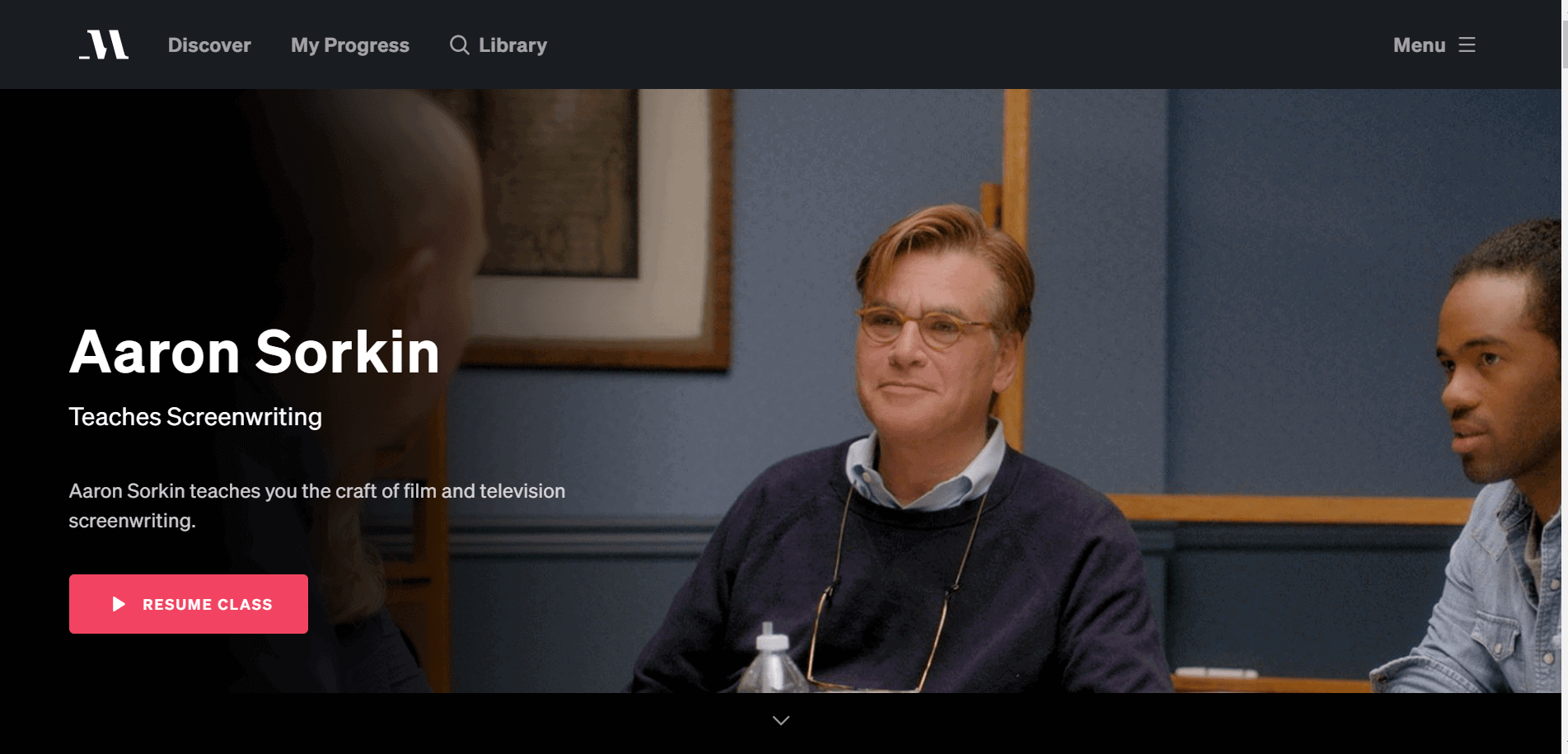
Aaron Sorkin Masterclass Lesson Plan
On the masterclass.com website, Aaron’s screenwriting masterclass is one of the longest available. It is very well-designed and in-depth. This is an especially good course if you only have time to take one of the many writing courses they offer.
Introduction
Meet your personal instructor, Aaron Sorkin, the ace screenwriter, Oscar winner, and TV hitmaker. Get a comprehensive introduction to the writer of some of the smartest dramas ever to hit the screen.
Intention & Obstacle
Aaron Sorkin has grown in the field with the idea that every great story is born from intentions and obstacles. Learn from the Oscar winner himself how to build the “drive shaft” to find the perfect captivating idea that will set your script in motion.
In his first video, Aaron covers his purpose and obstacle technique in depth. He discusses how to come up with them to keep you on track and use them.
As well as when and how to expose the audience to the motives and obstacles.
Story Ideas
Just having an idea and drafting it down as a script is not enough; you need to know if your idea is good enough to turn into a script. Each writer has a different way of coming up with ideas for stories.
Some use their own life or that of friends as inspiration. Others are watching people out on the street, sparking ideas for them.
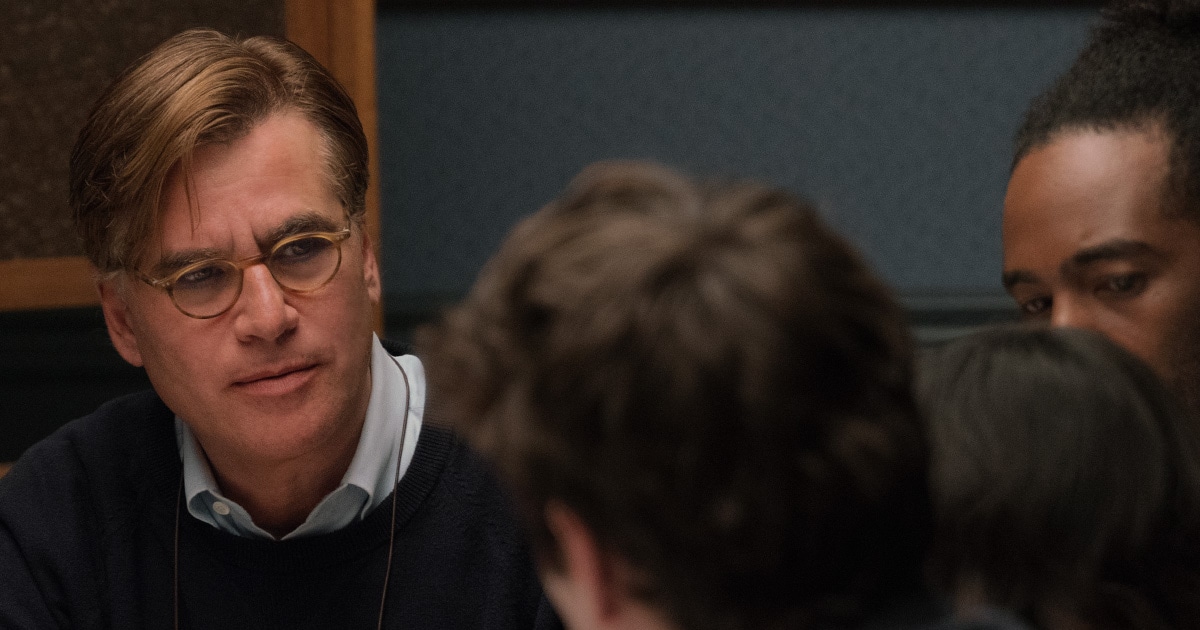
For Aaron, uniquely, it is places, displays, and events that often serve as the inspiration for an idea of a plot. For instance, while watching the ESPN show “SportsCenter” and pondering how it was made, he was inspired to write the TV series Sports Night.
Aaron is here to walk you through the steps every writer should take to test an idea. Furthermore, he will also guide you on how to decide whether your idea will work best on TV or film.
- Developing Characters: Part 1
Aaron Sorkin’s work in The Social Network is arguably his best to date and won him his first Oscar.
Now, in this lesson, he shares some of the decisions he made to develop some of his most unforgettable characters, particularly Mark Zuckerberg’s in The Social Network and The West Wing’s Toby and Leo.
- Developing Characters: Part 2
One important thing to remember while drawing characters is that they don’t necessarily have to be likable or like you.
Sorkin explains why he always empathizes with his characters while drawing examples from A Few Good Men and Steve Jobs, even if he disagrees with them.
Research
A great script lays the foundation for a great story but is baseless without good research.
Bad research is a waste of time, talent, and effort. In this lesson, Aaron shares lessons from Malice and The Social Network so that you gather the information you really need to tell the difference between a good and bad script.

Every writer needs to be an efficient investigator. Aaron’s method, once again, is a little different. About this aspect of the creative process, he is very descriptive. He covers the following throughout these two videos:
- With whom to talk?
- How to perform an interview
- Avoiding the execution of the pointless study
- How to examine the dialogue
- How to write about actual incidents
It was fascinating to learn how he approaches things when he is writing about real-life situations. Clearly, Aaron is a moral person with high standards.
He tries hard not to hurt the people about whom he is writing and to tell the truth. But in the tiny details, he also knows how not to get too bogged down.
Incorporating Research
Your research must be extensive, but not all your pages of research need necessarily be a part of your script. Aaron teaches you how to seamlessly weave research into your story by avoiding clunky expositions.
The Audience
Throughout his storied career, Aaron Sorkin has understood that the audience isn’t just watching his work, but they’re also participating in it.
Learn from the Oscar winner on how to write stories that will keep your viewers engrossed, entertained, and hooked to their seats throughout.
In this lesson, Aaron teaches you how to provide your audience with opportunities to take part. Providing them with the ability to sort out a few items in advance, for example. In order to see where the story goes. It makes them more focused when they can do this.
Rules of Story
Some golden rules of great drama always remain golden, even if they are centuries old. Aaron takes up this lesson to explain how most of the essential rules to great screenwriting were laid out more than 2,000 years ago by Aristotle in his Poetics.
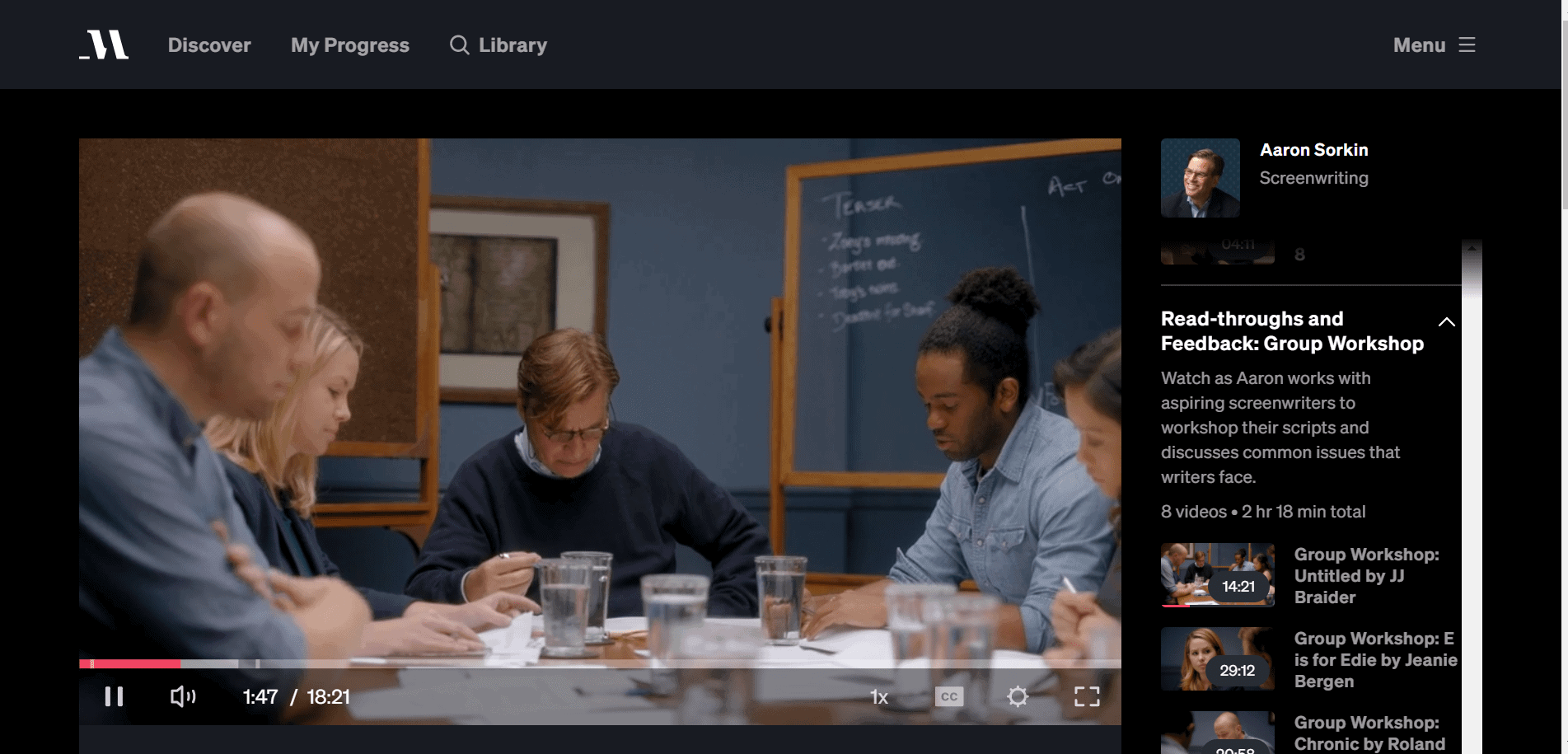
Not just that, he also takes things a level higher to teach you how to become a diagnostician for your own story ideas using those ancient lessons.
- Film Story Arc
Page numbers are a great tool for tracking the act structure, according to Aaron Sorkin, and equally important for the pacing of your story.
- Writing Habits
“Writer’s block” is defined as those points of the script where screenwriters get stuck or lost for ideas, and even Aaron admits to getting writer’s block. In this lesson, Sorkin will tell you how he tackles this block and what writing tools he personally uses to make sure he’s ready when inspiration strikes.
- Group Workshop: Untitled by JJ Braider
Aaron shares his tips on writing action scenes while workshopping J.J.’s script. He explains the scenes that move as fast on the page as they will on the screen.
- Group Workshop: E is for Edie by Jeanie Bergen
Aaron created a perpetual hit when he crafted offbeat characters in Jeanie’s script. In this lesson, Sorkin warns about the dangers of getting feedback from close-minded studio executives. (Warning: explicit content)
- Group Workshop: Chronic By Roland Zaleski
Aaron reveals a simple trick while discussing Roland’s script that writers can use to justify improbable events in their stories.
- Group Workshop: The Merc by Evelyn Yves
The opening scene of any movie or TV show packs the first and perhaps the most decisive punch to the viewer’s minds. In this lesson, Evelyn Yves talks about the importance of showing your audience something they’ve never seen before as she kicks off a conversation about opening scenes using her TV pilot, “The Merc.”
- Group Workshop: From Here to Alli by Corey Wright
Aaron discusses the importance of having confidence as a writer after workshopping Corey’s script and learning about his background. He also goes on to share his own origin story, taking you into a virtual flashback of his days as a struggling New York actor.
- Writing Scenes: Part 1
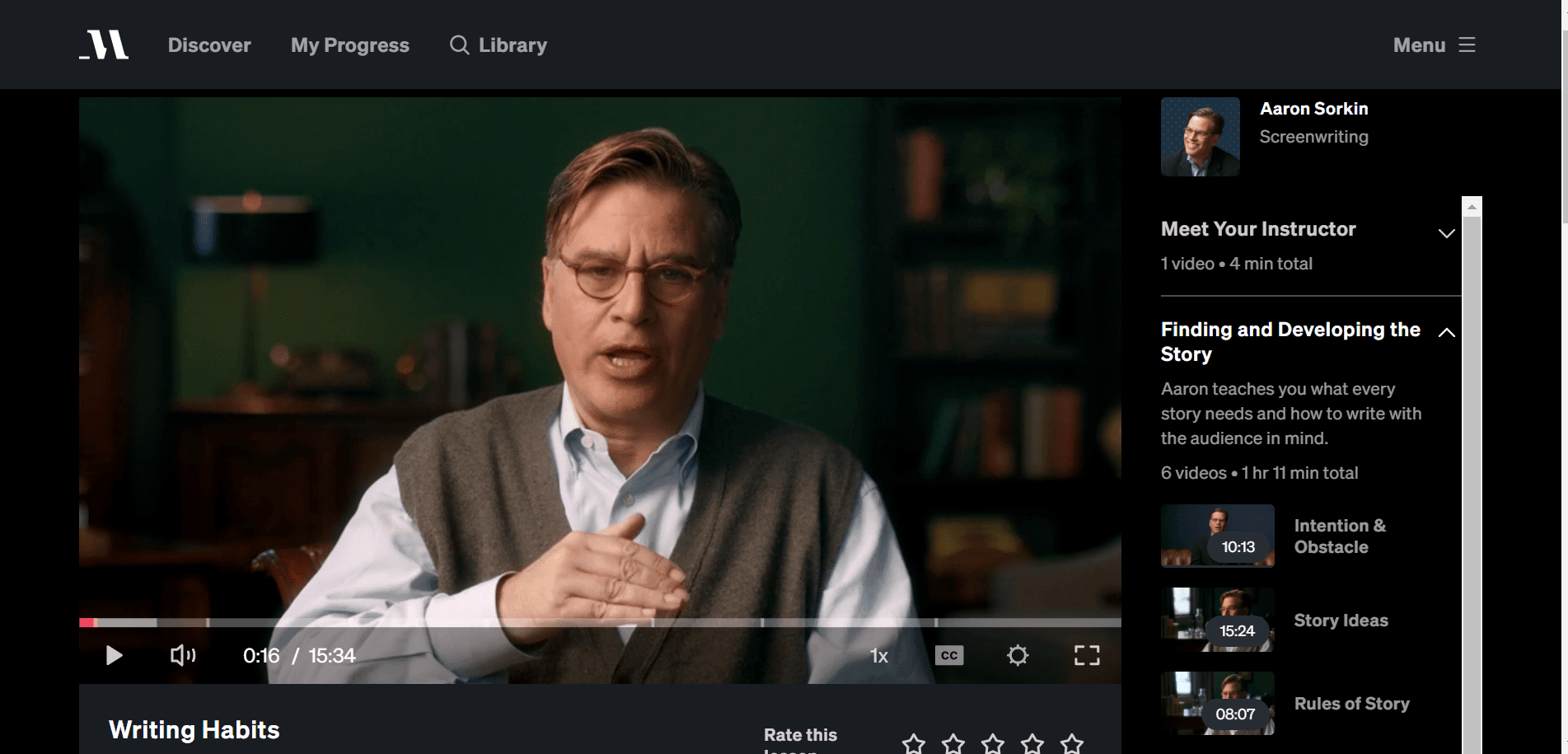
In this lesson, you will learn how a great story is not just limited to a collection of great scenes and how to give your script momentum from one beat to the next.
- Writing Scenes: Part 2
Any script you create can and will have only one opening scene, and it should be your dedication to make it memorable. Aaron Sorkin will teach you the art of crafting the perfect opening scene by introducing your theme, grabbing the audience, and setting up your characters’ intentions and obstacles.
- Scene Case Study: Steve Jobs
Aaron explains how crucial aspects like high stakes, strong intentions & obstacles, and competing tactics make for an exciting scene to write as he gives you a comprehensive case study of a scene from Steve Jobs.
- Scene Case Study: The West Wing
Aaron takes you through the scathing confrontation scene between President Bartlet (Martin Sheen) and Governor Robert Ritchie (James Brolin) as he analyzes this classic scene from The West Wing.
Writing Captivating Dialogue
Aaron Sorkin has garnered widespread critical and commercial acclaim for his trademark rapid-fire dialogue and extended monologues.
Now, Sorkin grants you the opportunity to learn how to write such dialogues as he shows how to make music with your words and put them to the test by performing your own scenes out loud.
Sorkin is fond of language. So much so that there is a kind of musicality to what he writes. It’s got a tempo and a rhythm. Now, I know this sounds complicated, and it does so in a way.
But Aaron takes you through an exercise that is surprisingly powerful and will help you learn how to do what he does.
He also takes you step-by-step through a scene from The West Wing. One that shows perfectly what musicality is as it applies to dialogue.
- Dialogue Case Study: The West Wing
Aaron conducts this lesson to take you through an in-depth analysis of the musical nuances of dialogue in the Bartlet–Ritchie scene.
- Rewrites: First Draft
Aaron Sorkin shares how Aaron reworks and strengthens his screenplays during the rewriting process to make you understand that script rewrites every now and then aren’t a sign of a bad script at all but are rather a sign of a good writer.
- Rewrites: Notes
As a continuation of the previous lesson, Aaron talks about how he reworks and strengthens his screenplays with help from trusted advisors, teaching you how rewrites aren’t a sign of a bad script.
- The West Wing Writers’ Room: Part 1
Aaron literally “breaks” part of the Season 5 premiere, an episode he’s never seen, as he creates a virtual writers’ room for you.
- The West Wing Writers’ Room: Part 2
In this lesson, Aaron teaches you how to reverse engineer a plot as he discusses what is needed in the teaser of the show.
- The West Wing Writers’ Room: Part 3
Aaron and the students continue to work together to break episode 501 of The West Wing.
- The West Wing Writers’ Room: Part 4
Aaron and the students discuss the limitations of the 25th Amendment to understand how research can drive the plot forward.
- The West Wing Writers’ Room: Part 5
Aaron guides you on how to keep your protagonists active as he elaborates on his golden advice: “When you have great characters, use them.”
- The West Wing Writers’ Room: Part 6
Aaron never discourages a bad idea and rather works on brushing it up. Watch how he and the students run through various plot ideas as the writers’ room continues.
- The West Wing Writers’ Room: Part 7
Aaron Sorkin has often been noted saying, “You don’t have to assault the audience with the plot”. Get tuned to this lesson as the writers discuss the limits of reality within fiction and the value of pacing.
- The West Wing Writers’ Room: Part 8
Aaron and the students discuss the lessons they learned as they wrap up the virtual writers’ room.
- Group Workshop: Pitch Session
Now that you have got your perfect screenplay, it’s time to pitch it. It’s time to learn how to effectively answer the questions Hollywood’s decision-makers will ask you during a pitch.
- Group Workshop: Aaron Pitches Mission to Mars
Aaron pitches his writers his idea for a brand-new TV series called Mission to Mars as he turns the tables on them.
- Closing Thoughts
This is the final lesson where Aaron Sorkin leaves you with one more assignment that will last the rest of your life as he offers his parting wisdom.
Pay Special Attention To…
Aaron’s Masterclass is pretty in-depth. There are a lot of things which you need to focus on.
So, if you’re reading this review, then here are some quick points that, according to us, you must pay attention to during Aaron Sorkin’s Masterclass.
Developing good writing habits
Aaron can create an entire TV series season from start to finish in between 18 and 24 months. Just about 2 months of the time is taken up with the actual writing portion. The study is the rest.
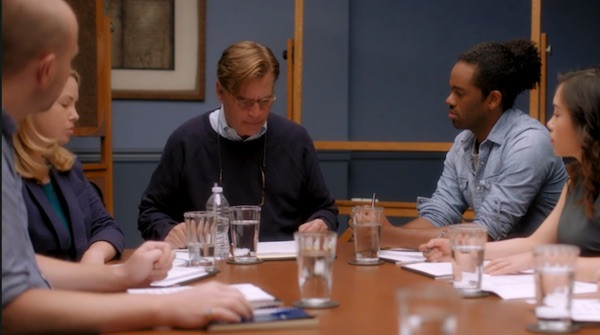
And writing isn’t always easy for someone like Aaron. I was shocked to hear that when things do not flow, he has days.
But he has picked up strategies over the years to get through those days and make sure they don’t happen often.
Aaron shares many writing techniques he has learned during this portion of his course. Some of the topics he discusses are here:
- The writing tools that he uses
- How to arrange your thoughts using index cards
- How far ahead does he intend what he’s going to write?
- Why do you have to be true to yourself as an author?
- How to treat writer’s block effectively
- Using music to inspire you to compose more effectively
- How to stop the act of writing from making you crazy
Aaron Sorkin´s group workshops with students
Aaron loves teaching, obviously, and is very good at it. So, interestingly, in his writing masterclass, he has included some workshops.
He sits down with a group of his students during them and goes through different strategies.
To do this, he also uses scripts and excerpts from books. Most of them can be downloaded as separate documents so that you can easily follow them. In his seminars, here is a summary of what he covers:
- Untitled by JJ Braider- How to write scenes for action
- E is for Jeanie Bergen’s Edie, how to introduce off-beat characters into your stories and do so in an apt manner.
- Chronic by Roland Zaleski- How to explain in your stories unexpected occurrences
- Evelyn Yves’s The Merc: How to Create Unforgettable Opening Scenes
- Corey Wright’s From Here to Alli: How to become a positive writer
**And more!
Writing rules for films and TV shows
As someone who has taken master classes in filmmaking and fiction writing, I know that creating a script is very different from creating a novel. So, it was nice to see Aaron cover each discipline separately.
But doing it like that means that he teaches you some material twice. For example, he covers how to create a successful opening scene twice.
You can use a set of basic rules when writing a screenplay, including coming up with them. Aaron is very good at offering practical tools and connections to resources for his students.
He genuinely wants you to be a better writer. Years after he first developed this course, his community pages are still active.
How do you write scenes?
It is important to write scenes that move in the right place and carry the plot forward.
This is the case regardless of whether you wrote a play, book, or script. Aaron takes you step-by-step through the following in this portion of his masterclass:
- Understanding of each scene’s intent
- Moving from one scene to another smoothly
- Preparing the audience for the next part of the story to move on
- How to give momentum to your script
- How to get the scenes’ rhythm right
- How to grab an audience’s attention
5 THINGS I loved about Aaron’s Masterclass!
There’s something for everyone in Aaron Sorkin’s Masterclass. Whether you are a pro writer, a beginner, or just an admirer of Sorkin’s works, he has some cool and interesting things to teach and share with everyone who is watching his lessons.
Though the entire course is amazing, here are 5 things from Aaron’s Masterclass that I loved the most!
1. Aaron´s intention and obstacle method
He is going through a process called “intention and obstacle” before Aaron starts work on a piece. First, he sits down and comes up with everything he desperately needs from his characters.
The thing that drives them, or things. He thinks instead of a daunting barrier, he can bring in their path.
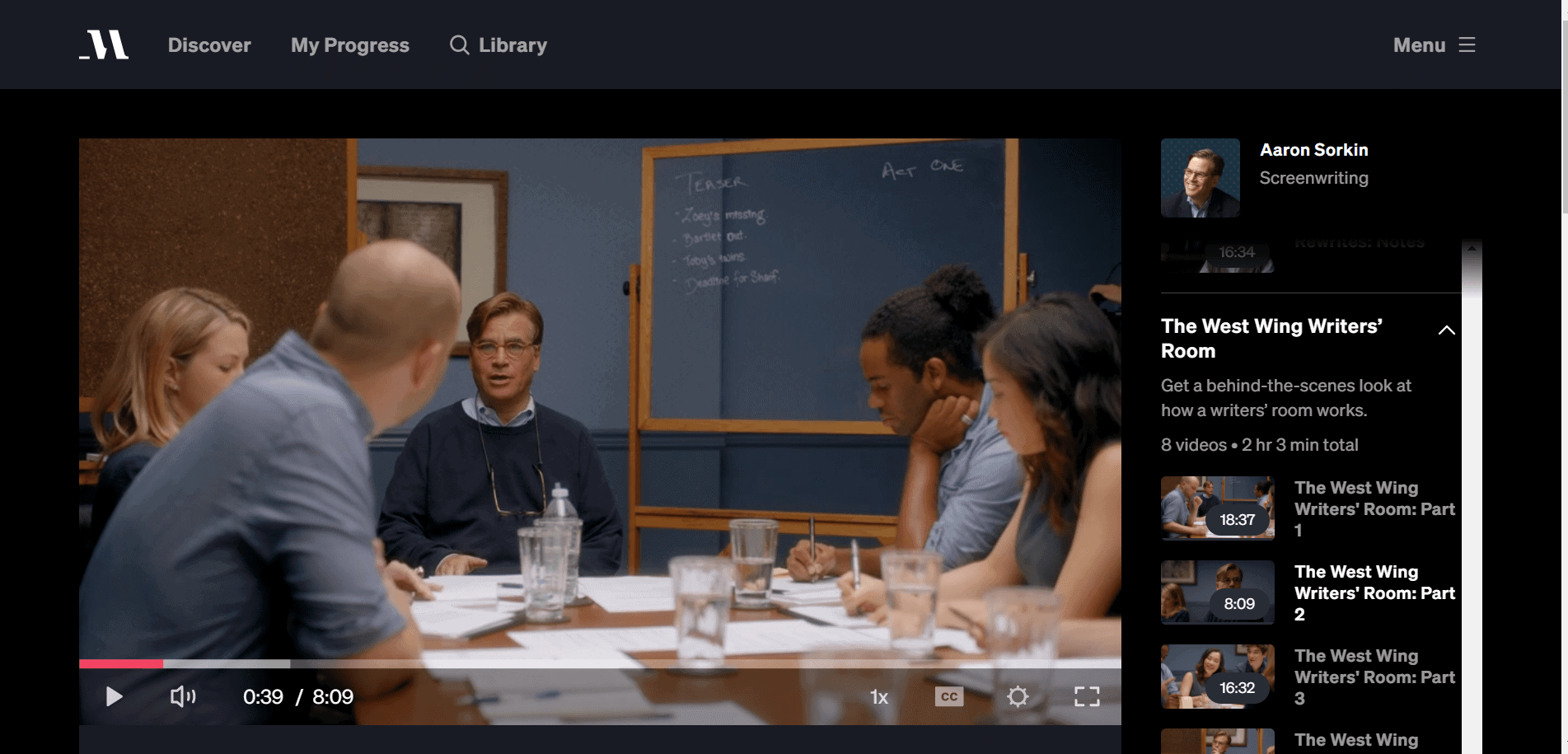
The structure prevents the stories, Aaron, from going off track. He’s come up with expectations and challenges for his characters that help hold him grounded when he is writing. In his first video, Aaron deals in depth with his goal and technique of obstacles.
He explains how to get them along and use them to keep you on track. As well as when and how to present the intentions and obstacles to your audience.
2. Coming up with story ideas
Every writer has a different way of coming up with ideas for stories. Some people use their own life as inspiration or as friends. Others are watching people on the street, sparking out ideas for them.
Unusually, it is places, shows, and events for Aaron that sometimes act as the catalyst for an idea of a story. For example, while watching the ESPN show “SportsCenter” and pondering how it was made, he was inspired to write the TV series Sports Night.
3. Developing your characters
The imaginative cycle of Aaron’s goal and challenge step is a crucial one. This is partly because it is what gives them meaning and inspiration. It is also what the journey takes that will shape the way they think and act.
Aaron takes a relatively straightforward approach when it comes to characters. He lets the plot decide how much each will need to grow. This saves time and energy because it ensures you don’t end up developing unnecessary personality elements.
To build their backstory, you can leave it up to the actor to fill out your characters.
To me, the second video was the most useful in this segment. In it, Aaron explains how he is creating characters with whom he has nothing in common. That goes for anti-heroes.
4. Writing captivating dialogue
Nobody, like Aaron Sorkin, authors dialogue. I’m a big fan of The West Wing and must have watched at least 4 times the entire season.
The show is already 20 years old, yet it is full of fantastic, fresh, interesting, and relevant lines.
Sorkin has a passion for words. So much so that there is a kind of musicality to what he is writing. It has got a pace and a rhythm. Now, I know this sounds complicated, and it is in a way.
Nevertheless, Aaron takes you through an exercise that is unexpectedly useful to help you learn how to do what he does. He’s also taking you through a West Wing scene, step by step. Another which demonstrates beautifully what musicality is as it relates to dialogue.
5. Aaron Sorkin´s writers´ room
He uses another kind of laboratory later in the course, too. It’s a place for authors to mock up. He takes you through the process of writing a scene from start to finish through 8 episodes and does so in great detail.
It is fascinating indeed. I can assure you that you haven’t seen anything like this before. If you’re a The West Wing fan, you’re going to really enjoy this section of the course. Even if you’re not a fan of the show, I’d still recommend watching it. They’re going to know a lot.
There’s some extremely valuable content for Amateur writers!
If you are a beginner or a novice at writing and storytelling, then Aaron has you covered as well.
Throughout his masterclass, he is up to giving some very vital information and tips for the section of his viewers who are not pros at writing and want to have a fruitful learning experience from the start.
Here are some important tips for amateur writers that Aaron shared!
- Getting the research stage right!
Each writer has to be an effective investigator. Aaron’s approach is a bit different once again. That part of the artistic process is very clear to him. He addresses the following during those two videos:
- Who to talk to?
- Conducting an interview
- Avoid carrying out meaningless research
- How do you research dialogue?
- Writing about real events
It was fascinating to learn how he approaches stuff about real-life incidents while he is writing. Clearly, Aaron is a decent individual with high expectations. He is trying hard not to hurt the people he writes about and to tell the truth. Yet he also knows in the small specifics how not to get too bogged down.
Aaron clearly states during this lesson that you have to judge for yourself what´s the more important truth if you are writing non-fiction.
- It’s important to understand your audience.
Whatever you write, you need to engage with your audience and take them with you. Aaron begins this lesson by discussing the work of the pointillist painter George Seurat.
He painted in a way that helped the audience in their mind’s eye to create more vibrant colors than he had applied to the canvas. It sounds odd, but you’ll understand what this means when you take the course. As well as how the art of writing applies.
- Developing good writing habits
Aaron can produce a whole season of TV series from start to finish in between 18 and 24 months.
For that time, the actual writing portion is only taken up for about 2 months. The remainder is science. Even writing is not always easy for someone like Aaron.

I was shocked to hear he had days when things didn’t work. Yet over the years, he’s learned strategies to get through those days to make sure they don’t happen often.
Aaron shares many writing techniques that he has learned during this section of his course. Here are some of the subjects he covers:
- The software he uses for writing
- Using index cards to organize your thoughts
- How far ahead he plans out what he is going to write
- The need to be true to yourself as a writer
- Dealing effectively with writer´s block
- How you can use music to write more efficiently
- How to stop yourself from going mad during the writing process
My thoughts about Aaron’s Masterclass!
Aaron’s masterclass in a single Masterclass is one of the longest available on the masterclass.com website. It’s very well-organized and deep-rooted. It is an especially good course if you only have time to take one of the other writing courses that they offer.
My recommendation would be to treat yourself to an all-access card.
This will just cost you the same as if you were buying two single masterclasses. And that pass will encourage you to take each of the 80-odd courses that they have at your fingertips.
So, you could be taking all 14 classes related to writing. They cover all types of writing, including fiction, non-fiction, documentaries, theatrical plays, and scripts for film or television.
If I were to teach you what I have learned from Aaron, we’d be here all day. And then, I created an outline of what you might expect to know from this course of 35-video learning.
Quick Links:
- Christina Aguilera Masterclass Review
- Spike Lee Masterclass Review
- James Patterson Masterclass Review
- Masterclass.com Coupons
FAQs | Aaron Sorkin Masterclass Review
The answer depends on what kind of educational experience you are planning ahead to get. If you want to learn independently, then MasterClass is the perfect option for you. All of the classes are perfectly organized and filled with information. As a result, you can learn your favorite subject at your own pace. You can get either one episode at a time, or you can binge-watch a whole course series just like you do on Netflix. The quality of their course is also pretty high, and the instructions have credibility. So you can be sure that you are experiencing quality learning. Also, it does not cost you way too much. So yes, it is definitely worth your money.
There are two plans that MasterClass has. You can either go for the individual to pass or go with the all-access pass. With the individual pass, you will only be able to access one course at a single time. Also, each course costs you $90. While the all-access pass costs you $180 in a year and it allows you to browse all the website content without any restrictions.
As of now, MasterClass does not offer any certificate to their students on course completion. However, they do send their students an email confirming that they have completed the course. The email will feature a congratulatory message along with some tips on how to further use the site to continue your studies.
MasterClass used to provide a free trial in the past. However, back in August 2018, they stopped giving out free trials. And this is no longer available.
In a single sentence answer, yes, the MasterClass is good. You will get a comprehensive video course from a world-class, successful person in their specific field. So you already know that you are going to get quality information. Also, the website covers a wide range of topics. The topics range from tennis to comedy to acting to singing to writing. Also, the website is bringing new topics now and then. Plus, with just a one-year subscription, you will get to access different topics and learn something new. Also, it is pretty affordable compared to many platforms available out there. 🙋♀️ Is Aaron Sorkin's MasterClass Worth The Money?
🤷♂️ How Much Does Aaron Sorkin's MasterClass Cost?
✅ Does Aaron Sorkin's MasterClass Give Any Certificates?
🔥 Does MasterClass Have A Free Trial?
🤔 Is MaterClass Any Good?
Conclusion | Aaron Sorkin Masterclass Review 2025
The best thing about masterclass teachers is that they are educated experts in their respective fields. So, you don’t have to worry that much about the Masterclass knowledge you’ll get.
The masterclass is a great way of learning online from top creators. It is a powerful online education platform featuring the best influences and gurus from the art industry, including Oscar- and Grammy-winning filmmakers, actors, screenwriters, multi-billion-dollar grossing directors, and many more, all under one platform.

